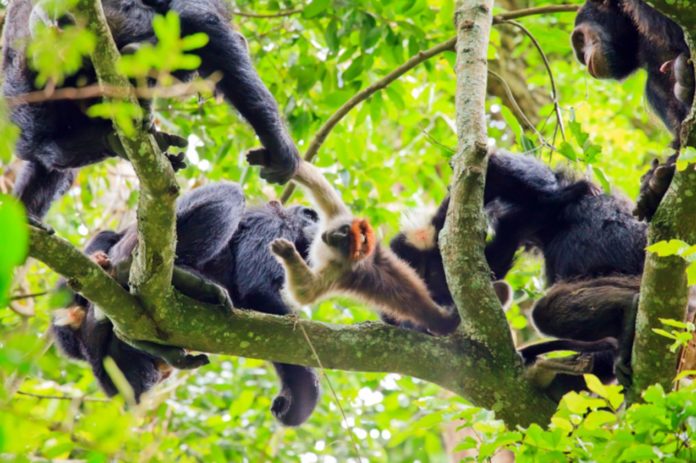Chimpanzees, like humans, use language to coordinate social cooperation, such as hunting.
Researchers from the University of Zurich and Tufts University have discovered that when chimps create a unique vocalization known as the “hunting bark,” they invite more group members to the hunt and catch their prey more effectively.
Chimpanzees occasionally seek out opportunities to get protein-rich meat, in addition to their fruit-based diet.
Chimpanzees are more likely to catch their fast monkey prey in the canopy if they hunt with others.
For the first time, scientists discovered that communication is critical in recruiting group members to join the search.
Hunting barks improve the effectiveness of the chase
For more than 25 years, researchers from the University of Zurich (UZH) and Tufts University (BU) in Boston have studied more than 300 hunting events recorded at the Kanyawara chimpanzee community in Uganda and discovered that by barking, the wild apes help to facilitate group hunting, making it more effective.
The study’s lead author, PhD student Joseph Mine at the Department of Comparative Language Science of UZH, says that “Chimps who produce hunting barks provide information to those nearby about their motivation to hunt, and this information may persuade reluctant individuals to join, boosting the overall chances of success.”
It can be difficult to go on a group hunt for monkeys in a deep tropical rainforest with little visibility. Vocal communication makes group work more effective.
“Strikingly, following the production of hunting barks,” adds study co-author Zarin Machanda, “we observed more hunters joining, greater speed in beginning the chase, and a shorter time to make the first capture.”
Despite the fact that hunts are more successful after a bark, additional investigation is required to determine why the barks have this effect.
“At the moment it is still unclear if these barks are given intentionally to coordinate the precise actions of the group,” explains UZH professor Simon Townsend, who helped lead the study, “or whether these barks simply advertise an individual’s decision to hunt, which in turn, increases the likelihood of others joining them and with more hunters they are more effective.”
Communication and collaboration co-evolved
The evolutionary biologists investigated a wide range of other elements that could influence the result of a hunt, including as the presence of expert hunters and other diversions, but the existence of hunting barks remained a key factor.
“Communication plays a key role in coordinating complex acts of cooperation in humans,” adds Townsend, “and this is the first indication that vocal communication might also facilitate group cooperation in our closest living relatives.”
It is widely acknowledged that human communication and collaboration have co-evolved and are intrinsically related.
As one became more complicated through time, so did the other, resulting in a feedback cycle that eventually led to language and the highly intricate types of collaboration that modern people participate in.
Evolutionary roots dating back at least 7 million years
It was uncertain, however, how far back in human development this association between group cooperation and communication could be traced.
According to Joseph Mine’s analysis, “Our results indicate that the relationship between vocal communication and group-level cooperation is ancient. This link seems to have been in place for at least 7 million years, since our last common ancestor with chimpanzees.”
Image Credit: Getty
You were reading: New Paper Reveals Secret Messages Hidden in Chimpanzee “Bark”
